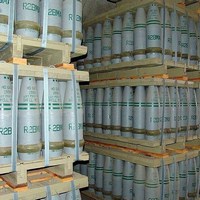Although welcome, the U.S.-Russia agreement on Syria’s chemical weapons reached this weekend in Geneva will prove difficult to implement. Some of these problems can be reduced with concerted effort and continued focus. But the Syrian crisis should not be seen in a vacuum—it is the latest in a series of chemical weapons crises that includes Iraq and Libya. As a result, the United States and other countries should respond not only by working to implement the U.S.-Russia deal, but also by strengthening broader nonproliferation efforts as well as their own national instruments for combating chemical weapons use and proliferation.
The U.S.-Russia agreement aims to destroy Syria’s weapons by 2014. The government of Syrian President Bashar al-Assad will be required to turn over a comprehensive inventory of its chemical weapons holdings—including the types of agents and delivery systems, their location and conditions of storage, and a listing of all its research, development and production facilities—within one week. The Organization for the Prohibition of Chemical Weapons (OPCW), which monitors member states’ compliance with the Chemical Weapons Convention (CWC), would then conduct an initial on-site inspection of Syria’s declared sites by November to determine how to destroy them. The chemical weapons would then be completely destroyed by the first half of 2014.
The agreed-upon schedule for disposing of Syria’s chemical weapons is an unprecedented attempt to fit several years’ worth of work into several months. Even without the threat of sanctions, the Syrian government lacks the expertise and perhaps the money to implement such an accelerated timetable. Disposing of chemical weapons is a dangerous process that must be done carefully by trained personnel in specialized facilities—Syria has neither. While the OPCW will supply technical advisers, the experience with other states that have destroyed their chemical weapons indicates that constructing and then operating the elimination facilities will take years.

